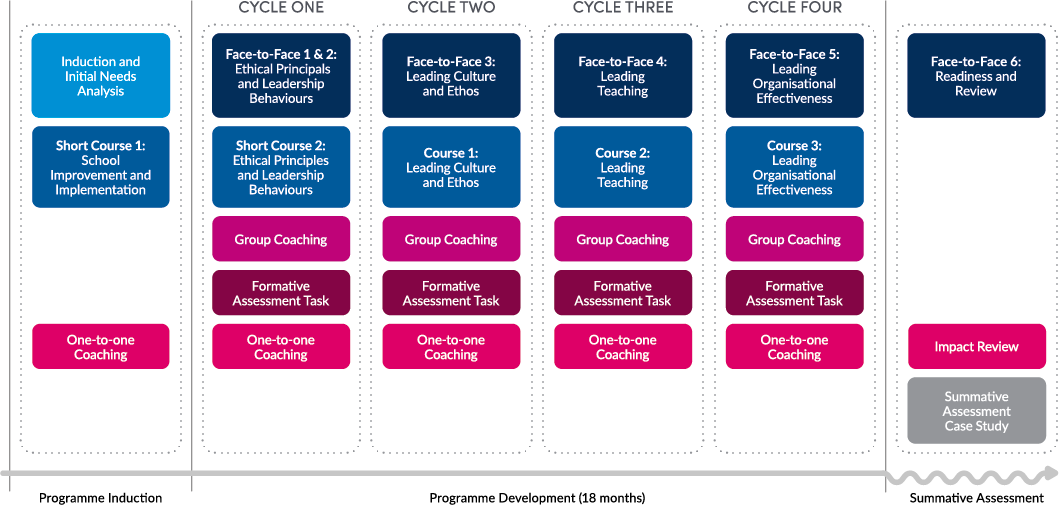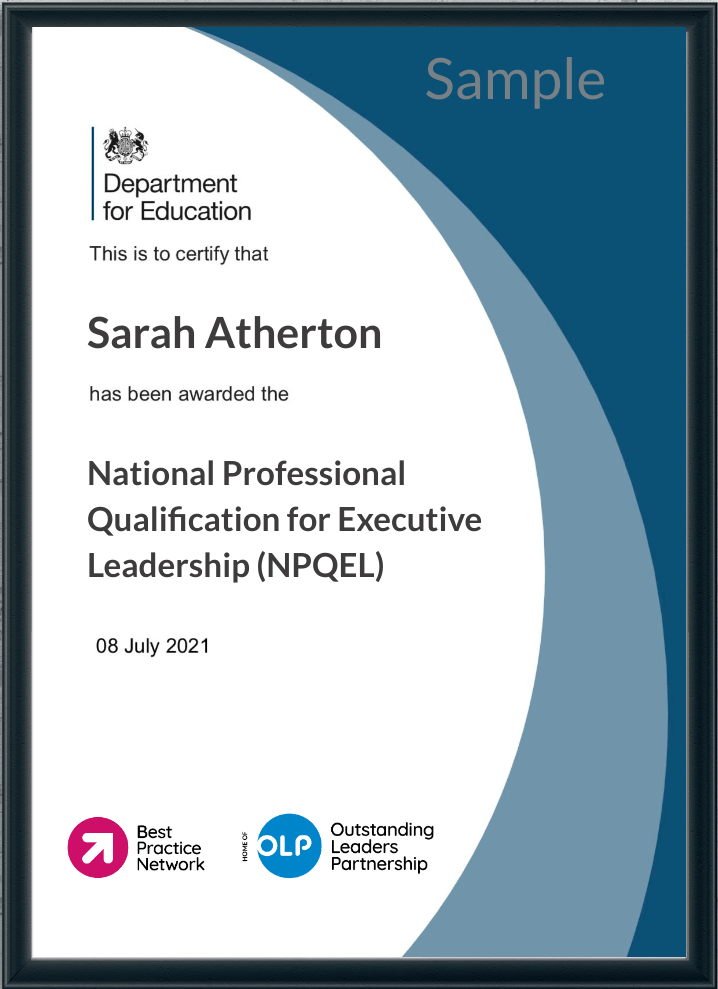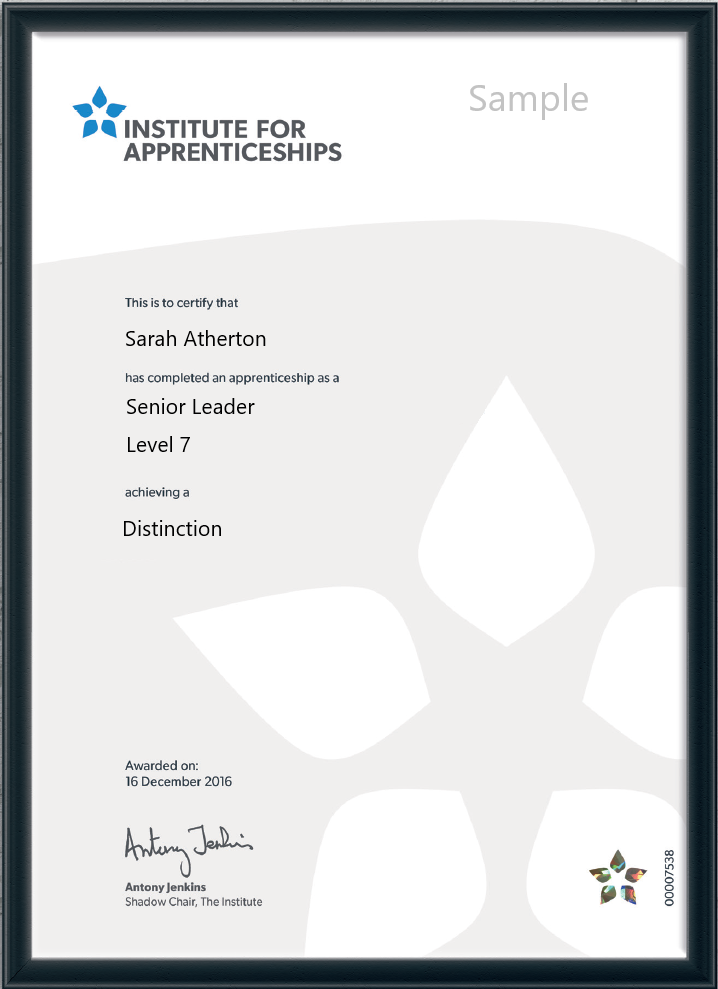National Professional Qualification
for Executive Leadership (NPQEL)
For school leaders who are, or are aspiring to be, an executive headteacher or have a school trust CEO role with responsibility for leading several schools.
![]() Develop a Broad Understanding of System Leadership
Develop a Broad Understanding of System Leadership
![]() Awards up to 100 Master's Credits
Awards up to 100 Master's Credits
![]() Establish and Sustain a MAT's or Schools Group's Strategic Vision
Establish and Sustain a MAT's or Schools Group's Strategic Vision
![]() Apply Now
Apply Now
National Professional Qualification (NPQ): Executive Leadership
Benefits for Participants
- Increased knowledge and understanding of what effective executive leaders need to know (learn that), and to be able to do (learn how to), to successfully lead the strategic direction of a trust and its constituent schools.
- Opportunities to network with other leaders, both nationally and internationally, in order to reflect on the latest research into effective trust leadership and to explore practice in settings different to their own.
- Choose what to study. Our regular needs analyses support participants to focus their energies on those leadership domains they most wish to develop.
- Assessment tasks that involve professional enquiry into practical elements of trust organisation.
- Individual coaching focused on current personal professional needs provided by our experienced performance coaches.
- Flexible delivery arrangements according to needs and circumstances.
- The NPQEL qualification is aligned to Masters credits and can act as a springboard on to Liverpool Hope University’s MA in Leading in Education or the MBA in Educational Leadership.
Benefits for schools and trusts
- A leader who is able to set, and deliver, an ambitious vision for the trust.
- A leader equipped with essential knowledge and understanding of the relationship between the different domains an executive leader must lead.
- A leader who can lead and establish a culture of professional evidence-based enquiry throughout the trust and support other leaders in its implementation.
- A leader with the skills to weigh the benefits of establishing common systems and practices across a trust against the benefits of with providing the constituent schools with the freedom to develop their own practices.
- A leader with a deep understanding of the complexities of implementing sustainable change across several organisations.
- A leader who shares common understandings and a shared professional language with other leaders within and beyond their trust – the ‘golden thread’ of professional development
How is NPQEL delivered?

A Blended Learning Model
NPQEL makes use of a blended delivery model consisting of face-to-face events, online study, webinars and coaching.
.png)
NPQEL participants will attend 6 face-to-face events (including 1 x 2 day conference) via the blended delivery model. Our nationwide delivery partnership network allows us to bring face-to-face training to a regional conference centre near you, facilitated by experienced school leaders and facilitators.
.gif)
Participants access online learning and support via our virtual learning environment (VLE) Canvas. Through Canvas, participants are able to engage with learning communities of peers and access multimedia content. They can also access research and expert school-led practice aligned to the curriculum content for the qualification and receive high-quality feedback from experienced performance coaches.
Leadership Performance Coach
The leadership performance coach is a participant’s main point of contact for the duration of the NPQEL. Their role is to support a participant’s progress and development through the programme. They will respond to practice task activities completed for each online course and provide challenge and feedback on each of the formative assessment tasks. Each participant will receive small group and individual coaching sessions from their leadership performance coach to develop their thinking and support their progress.
In-school Sponsor
The in-school sponsor is someone who the NPQEL participant can check in with across the duration of the programme and who can provide relevant professional guidance, support and challenge. The sponsor is not a formalised programme role but a go-to person to talk about their learning and development from the qualification and its application in practice. The sponsor may be a leader from another school/organisation.
NPQEL Qualification Structure

NPQEL Framework
The NPQ frameworks are based on a robust method of design and development, building on the evidence base and expert guidance already established in the ECF and the ITT Core Content Framework. The NPQ frameworks reflect the Teachers’ Standards and Headteachers' Standards to ensure coherency with the requirements already used by the teaching profession.
Please see the National Professional Qualification for Executive Leadership Framework below. If your computer or device does not support the Adobe plugin you can download the framework pdf here.
Who is this for?
NPQEL is suitable for school leaders who are, or are aspiring to be, an executive headteacher with responsibility for leading several schools and have a minimum of three years as a headteacher or head of school.Requirements
Applicants must have full support from their school/organisation. A head teacher, member of the SLT, line manager or Chair of Governors (or similar authoritative role) must confirm their support and that all information submitted is true and correct. This is a Department for Education mandatory requirement.
To apply for NPQEL, applicants must have the following:
- Teacher reference number
- 2 years teaching experience
- Leadership aspiration/experience
- 3 years experience as a headteacher
If you are unsure if you meet the above requirements, or have other relevant experience, then please contact our team who will be able to support your application.
What does it cost?
Candidates from international schools should visit our NPQEL International page for international prices.
Next Steps
Applications are now closed for Autumn 2025. You can register your interest in our next cohort below.
Executive Leader Programme (Level 7 Apprenticeship with NPQEL)
Stand out from the crowd and complete NPQEL whilst simultaneously working towards the Level 7 Senior Leader Standard - a cross-sector leadership qualification which is the perfect accompaniment to the NPQEL.
The Leaders Apprenticeship with NPQEL is funded by the Apprenticeship Levy or government co-investment and comes with a whole raft of extra support, resources and content compared with completing a standalone NPQ.
Participants receive added support in the form of monthly meetings with a dedicated Apprenticeship Tutor. Our Apprenticeship Tutors are themselves experienced school leaders and headteachers and are able to offer invaluable assistance and advice for the duration of the programme.
One Programme, Two Qualifications
Graduates of the Leaders Apprenticeships are awarded two qualifications which are completed at the same time and within the same 18 month period as the standalone NPQEL. As well as benefitting from the full NPQEL content and delivery, participants receive extended leadership training, webinars and monthly meetings with an Apprenticeship Tutor to ensure they meet the requirements of the Level 7 Senior Leader Standard. Compared with the standalone NPQEL, there are approximately 80 additional learning hours spread out over the 18 month duration of the programme.

National Professional Qualification for Executive Leadership
Professional registration links: NPQEL

Level 7 Senior Leader Standard
Professional registration links: Chartered Manager (CMgr MCMI) or Chartered Fellow (CMgr FCMI), The Institute of Leadership and Management
Next Steps
To find out more and apply, please visit the Executive Leaders Apprenticeship with NPQEL webpage.


.gif)

.png)
